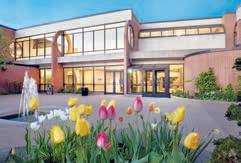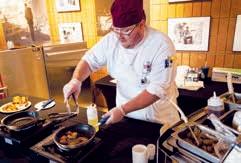
3 minute read
BIDWELL TRAINING CENTER


Advertisement
The Future Requires Flexibility
by Martin Miron
The nonprofi t Bidwell Training Center (BTC) is a postsecondary career and academic training institution established in 1968 to provide vocational training and employment opportunities to local residents. Rather than following a college or university model where majors remain fairly static and the responsibility for any kind of professional development or employment is left to the graduate aft er school, BTC forged a diff erent path. By establishing advisory boards for each major made up of industry leaders and employee partners, what was once a trade school has evolved into an institution of workforce development that helps individuals fi nd meaningful and family-sustaining employment. Current majors off ered by BTC refl ect the present-day job market of Pittsburgh: Culinary Arts, Chemical Laboratory Technician, Horticulture Technology, Medical Assistant, Medical Coder/Biller and Pharmacy Technician. Th rough the years, establishing a robust evaluation process of these majors to ensure that instruction is industry-standard and comprehensive has been key to the success of BTC and its students. Director of Communications Jonathan Zito sates, “Investing heavily in student services like computer literacy, tutoring, placement and counseling also meant that the measure of success for our programming centered around the success of our graduates beyond their time in the classroom.” Bidwell Training Center is led by Executive Director Dr. Kim Rassau as an affi liate organization under the umbrella of Manchester Bidwell Corporation. It is ultimately under the leadership of MBC President and CEO Kevin Jenkins. Bidwell receives funding from the state of Pennsylvania, private foundations and individual donors, making it possible for all students that are residents of Pennsylvania and have a high school diploma or equivalent to receive full tuition, textbooks, uniform any special supplies required for training. Bidwell Training Center off ers no-cost programs to qualifying students, including chemical laboratory technician, culinary arts, medical assistant, horticulture technology, medical coder/biller and pharmacy technician. Originally located on Bidwell Street in the Manchester neighborhood of Pittsburgh’s North Side, the primary focus of training was in construction trades. Th e school became licensed in 1969 by the Pennsylvania Department of Education and continued developing a variety of trades programs. In 1972, William Strickland, Jr. was hired to lead BTC, and his vision and philosophy helped BTC evolve into what it is today by creating a unique learning environment that would serve the needs of the community and provide educational opportunities to anyone aspiring to achieve their dreams and goals by becoming productive, employed citizens. During the 1980s, opportunities in the construction fi elds continuously shrank. Instead of training people for jobs that didn’t exist anymore, that became a decisive moment for BTC, and a clear vision was set out that the priority must be employment fi rst and foremost. Relocating to Metropolitan Street in 1986, the new facility allowed BTC to continue its growth and movement away from construction trades to technical and healthcare-related industries. In 1999, the campus expanded with the opening of Harbor Gardens Park, located nearby at 1650 Metropolitan Street. In 2003, BTC opened the Drew Mathieson Greenhouse at 1600 Metropolitan Street. Th is 42,000-squarefoot educational greenhouse provides students in Horticulture Technology, a new major approved in 2002, an opportunity to receive hands-on training in a modern facility. Zito says, “All of our programming is directly informed and advised by our Pittsburgh-area employer and industry partners. By keeping these partnerships active throughout the year, we are able to guarantee that our graduates not only have the competencies necessary to succeed in their careers, but also provide employment tracks to fulfi ll the workforce needs that surround us. COVID pushed us to expand our resources for students and faculty, including a new ongoing program to provide Google Chromebooks to all our enrolled students. Th is allows us to bridge any digital divide that might otherwise leave students behind.” Bidwell is undertaking signifi cant expansions of its horticulture and agricultural offerings in the Drew Mathieson Greenhouse with a plan to expand food production to both enhance educational opportunities for students and provide food security to surrounding neighborhoods.

Th e Bidwell Training Center is located at 1815 Metropolitan St., in Pittsburgh. For more information, call 412-323-4000, ext. 239, or visit BidwellTraining.edu.









